Seven Local Projects: Highlights from the Bass Connections Annual Report
September 1, 2021
Through year-long project teams, summer programs and collaborative, project-based courses, the 1,400 faculty, staff and students participating in Bass Connections last year showed enormous creativity and adaptability as they found new ways to connect with each other and external partners.
The following examples provide a glimpse into the the ways in which Duke students worked with small teams of faculty, fellow students and external partners to address important local and global challenges.
Improving Food Security for Latinx Communities
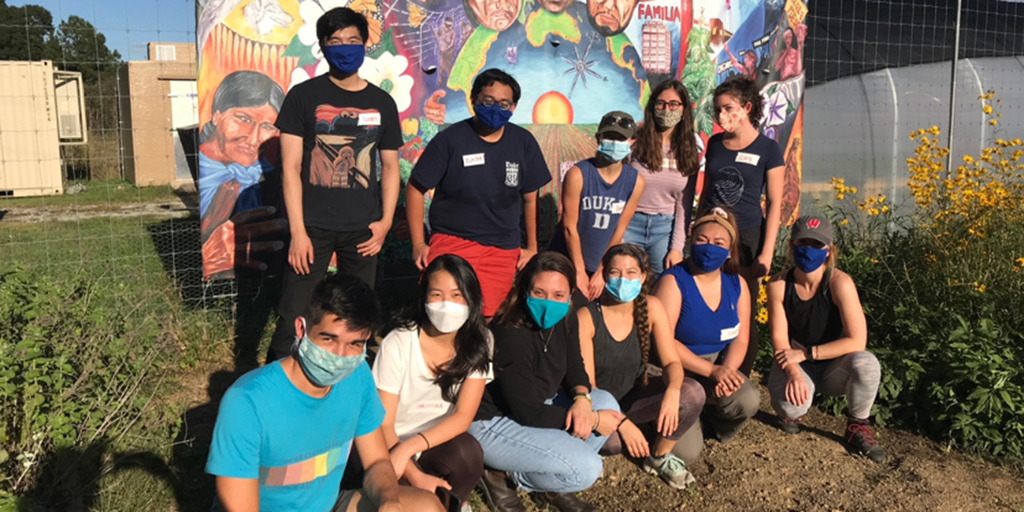
In 2020-2021, 13 Bass Connections project teams tackled research related to the impact of the COVID-19 pandemic. One project team took on the problem of food insecurity among Durham’s Latinx residents, one in five of whom said they sometimes skipped or limited their meals. Read more.
I felt a connection to the members of my team, even if the age gap between us could span years. I was able to use some of them as resources for what I wanted to pursue academically during my own time, and I felt that I could make a contribution to the team’s trajectory and analysis of the issues, even as a first-year student. –Elaijah Lapay ’24
Rising Seas, Local Impacts

This project team explored how the arts can educate, motivate social action and imagine a more resilient future. Team members constructed Spectral Seas, an art installation depicting the scale of future sea level rise, and used StoryMaps to showcase the science and local impacts of sea level rise. Read more and watch their video.
I think we’ve been able to create something that everybody is proud of. The experience has been so enriching and positive, and we have all learned different mediums we haven’t worked in before. –Raquel Salvatella de Prada, Associate Professor of the Practice of Art, Art History & Visual Studies
Promoting Regenerative Grazing in North Carolina
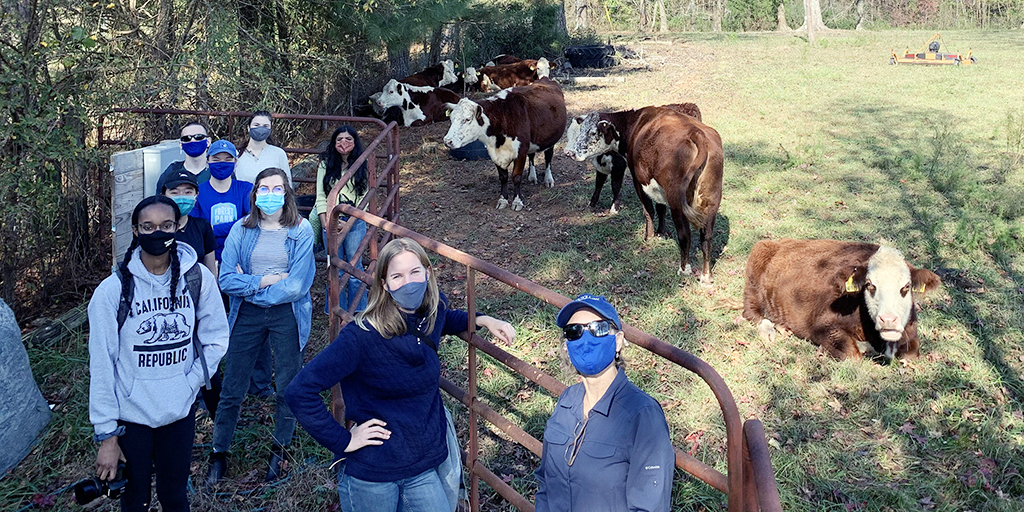
Beef production is one of the largest contributors to climate change. This project team set out to communicate that “it’s not the cow, it’s the how.” Working with partner organizations, team members developed healthy soils policy recommendations for North Carolina, as well as tools to help producers and policy-makers understand the potential of regenerative grazing. Read more and watch their video.
We’ve been working with the Triangle Land Conservancy on a specific piece of land, on which they are implementing some of these grazing practices. Developing relationships with people who are in the Triangle area has been really valuable, both personally and professionally. –Bridget Eklund, J.D. ’21, Presidential Management Fellow with the U.S. Department of Agriculture’s Natural Resources Conservation Service
Coping With COVID-19 as a Family
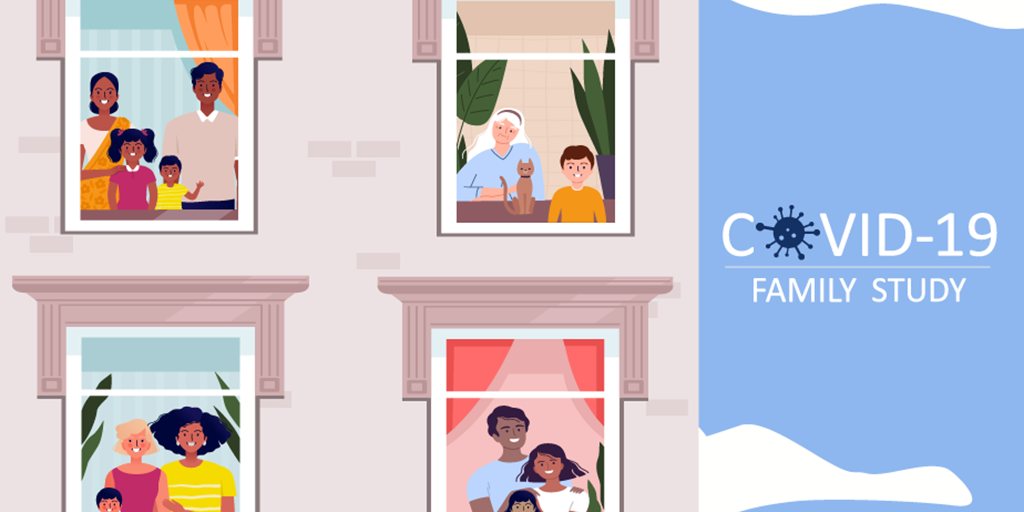
The project team adapted several approaches to improving families’ mental health and wellbeing that had proved effective in Kenya for use in North Carolina. Around 25 families in Durham and surrounding areas took part in the eight-week Coping Together program, adapted in collaboration with community partners. “I don’t see it ending at the end of eight weeks,” said Wanda Boone, director of the community coalition that implemented Coping Together. Read more and watch their video.
Usually, it’s an institution hiring people to come in and do this work, and I don’t know about the success of that. With this, because it’s embedded within the community and has full community participation, I think that is really going to be what makes the difference. –Wanda Boone, Founder of Together for Resilient Youth
Race and Home Values in Durham

The median white household in the U.S. holds about ten times as much wealth as the median Black household. This Data+ summer project, in partnership with the Samuel DuBois Cook Center on Social Equity, examined the relationship between race and home values across several units of analysis. Read more and watch their video.
I didn’t really know how data science research applied to social science, but Data+ showed me that it can be a really successful avenue for discovery and change. –Nick Datto ’23, Political Science and Public Policy
Reducing Hypertension Disparities
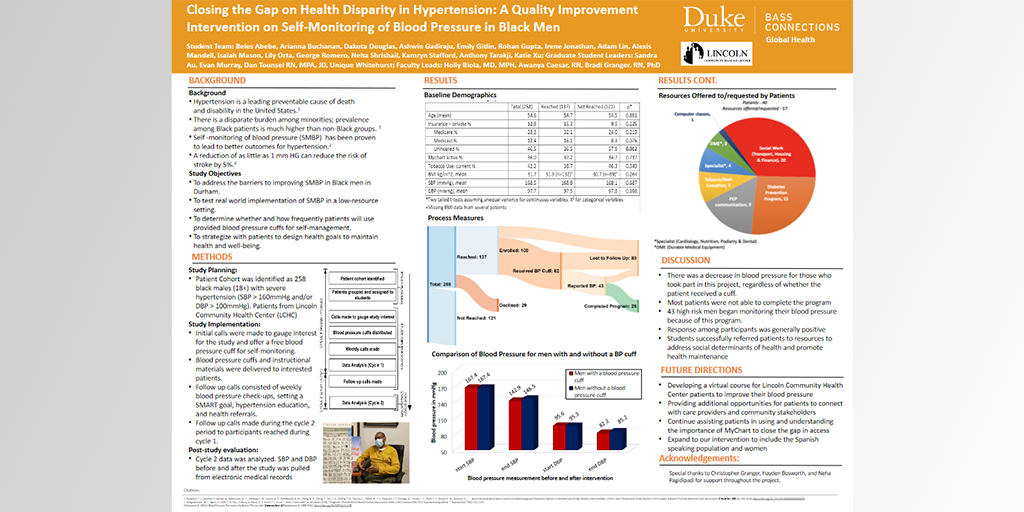
In Durham County, more than two in five adults suffer from hypertension. Since there is a strong association between hypertension and residential racial isolation, this project team tested strategies to intervene at the neighborhood level, in partnership with Lincoln Community Health Center. Read more.
I was able to get first-hand experience working with students from a multitude of disciplines and academic levels to understand what it takes to implement an effective community interventional study. I was especially surprised how open the professors and graduate students were to working directly with undergraduates. –Ashwin Gadiraju ’24, Biomedical Engineering
Refugee Experiences in Durham
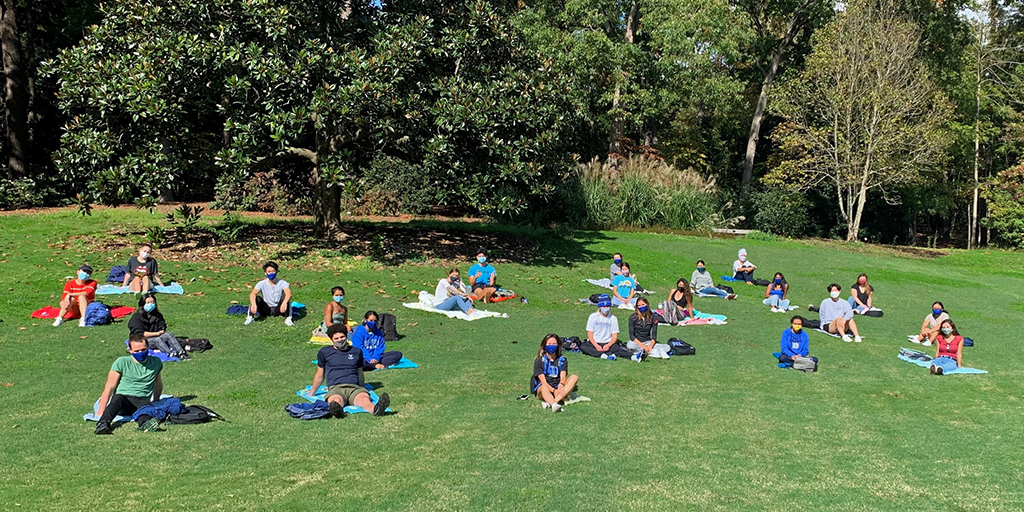
Through a Bass Connections Collaborative Project Expedition, Ph.D. candidate Colin Birkhead worked with Professor Jen’nan Read to redesign her course on immigration and health. Together they created hands-on, project-based learning experiences with a community partner, World Relief Durham, in order to enhance in-class lectures and academic readings. Read more.
I now have a blueprint for creating project-based courses, and I plan on applying this experience to my area of expertise to create a new course that ties real-world examples from a community partner with theoretical background from academic research. –Colin Birkhead, Ph.D. candidate in Sociology
Browse the Bass Connections 2020-2021 Annual Report
|
Learn More
- Read about the new Race & Society theme led by Tyson Brown.
- Submit a proposal for a 2022-2023 Bass Connections project by November 1.
- Explore highlights from the Bass Connections Virtual Showcase.

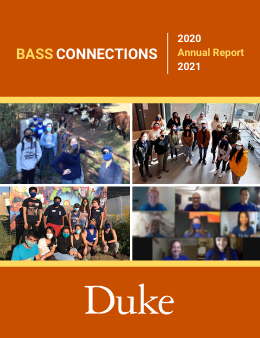 Message from Leadership
Message from Leadership